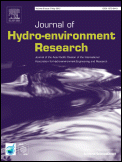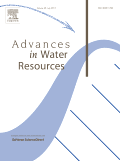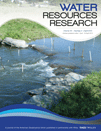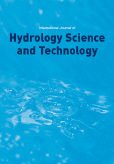
Journal of Hydro-environment Research
Scope & Guideline
Bridging human activities and water resources through research.
Introduction
Aims and Scopes
- Hydrological Modeling and Forecasting:
The journal emphasizes the development and application of various hydrological models, including machine learning and statistical techniques, to predict streamflow, flood events, and sediment transport. - Water Quality Assessment and Management:
Research articles often focus on assessing water quality parameters, impacts of pollutants, and strategies for mitigating water quality issues, particularly in urban and agricultural settings. - Climate Change Impacts:
The journal explores the effects of climate change on hydrological cycles, water supply, and ecosystem health, highlighting adaptive management strategies for resilient water systems. - Sediment Transport and River Dynamics:
A core area of research includes the study of sediment transport processes, river morphology, and the impact of human interventions on riverine environments. - Integrated Water Resources Management (IWRM):
The journal advocates for integrated approaches to water resources management, considering social, economic, and environmental factors in decision-making. - Innovative Technologies in Water Management:
Research on the application of novel technologies, such as IoT, remote sensing, and advanced modeling techniques, is a significant focus, aiming to improve water management practices.
Trending and Emerging
- Data-Driven Approaches and Machine Learning:
There is a growing trend towards the application of data-driven models and machine learning techniques for hydrological forecasting, water quality assessment, and environmental monitoring, reflecting the increasing availability of data and computational power. - Climate Resilience and Adaptation Strategies:
Research focusing on developing adaptive management strategies to enhance climate resilience in water resources is gaining prominence, addressing the urgent need for sustainable practices in the face of climate change. - Urban Hydrology and Sustainable Drainage Solutions:
An increasing number of studies are dedicated to urban hydrology, particularly in developing sustainable drainage systems and low-impact development practices to manage stormwater effectively. - Integrated Coastal Zone Management:
Emerging research themes are focusing on the integration of hydrodynamic modeling with coastal management practices, reflecting the growing importance of addressing coastal issues in the context of climate change and sea-level rise. - Ecosystem Services and Water Management:
There is a notable trend towards investigating the relationship between water management practices and ecosystem services, emphasizing the need for holistic approaches that consider ecological impacts.
Declining or Waning
- Traditional Hydraulics without Modern Techniques:
Research focusing solely on classical hydraulic principles without incorporating modern computational techniques has decreased, as there is a growing preference for studies that integrate advanced modeling and simulation. - Localized Case Studies with Limited Generalizability:
Papers that focus on very localized case studies without broader applicability or implications have become less frequent, as the journal favors research that contributes to global discussions or can be generalized across different contexts. - Static Water Quality Analysis:
Static or snapshot analyses of water quality that do not consider temporal changes or the impact of dynamic environmental factors have waned, reflecting a shift towards more comprehensive, time-series analyses. - Generalized Flood Risk Assessments:
Studies that provide generalized flood risk assessments without incorporating specific local conditions, climate scenarios, or adaptive management strategies have declined in favor of more nuanced, localized approaches.
Similar Journals

Water Resources
Fostering scholarly dialogue on critical water issues.Water Resources, a prominent journal published by MAIK NAUKA/INTERPERIODICA/SPRINGER, focuses on the critical and evolving field of water science and technology. Established in 1976 and with a long-standing commitment to advancing knowledge, this journal explores interdisciplinary research that addresses the challenges surrounding water resource management, quality, and sustainability. With an impact factor positioned within the Q3 category of its field, it holds a notable Scopus rank (#181/261) in Environmental Science, emphasizing its role in driving scholarly discourse. While currently not open access, Water Resources provides vital insights for researchers, professionals, and students, making it an essential resource for those seeking to innovate and implement effective water management solutions. To stay ahead in a domain that is increasingly paramount to global sustainability efforts, consider engaging with the latest research published in this vital journal.

ADVANCES IN WATER RESOURCES
Unveiling cutting-edge methodologies for water management.ADVANCES IN WATER RESOURCES is a premier peer-reviewed journal published by Elsevier Science Ltd, dedicated to advancing the field of water science and technology since its inception in 1977. With an impressive Q1 ranking in the field, this journal provides a vital platform for researchers, professionals, and students to disseminate cutting-edge research that addresses critical issues related to water resources management, hydrology, and environmental sustainability. The journal offers a comprehensive collection of articles that explore innovative methodologies, policy implications, and case studies that shape the future of water resource management. Although it does not provide open access, its impactful contributions are recognized globally, making it an essential resource for anyone engaged in water science. The journal continues to publish relevant research while looking forward to bridging the gap between theoretical insights and practical applications up until 2024.

Journal of Water Management Modeling
Advancing Knowledge in Civil Engineering and Water TechnologyThe Journal of Water Management Modeling, published by COMPUTATIONAL HYDRAULICS INT, stands as a pivotal resource in the fields of Civil and Structural Engineering, Geography, Planning and Development, and Water Science and Technology. With an ISSN of 2292-6062, this Canadian-based journal has earned its reputation by exploring innovative modeling approaches to enhance water management, crucial in addressing today's environmental challenges. Despite its current Q3 status in Civil and Structural Engineering and Water Science categories, alongside a respectable Q2 rank in Geography, the journal is committed to advancing knowledge and fostering collaboration among researchers, practitioners, and students passionate about the sustainable management of water resources. The journal operates on an open-access model, ensuring research is readily available to a broad audience, and has converged its editorial focus from 2018 to 2024, continuously adapting to emerging trends and technologies within the discipline. As a part of the global conversation regarding effective water management, it plays a vital role in informing policies and practices that impact communities and ecosystems alike.

Vietnam Journal of Earth Sciences
Exploring Earth's Mysteries, Empowering Scientific ProgressThe Vietnam Journal of Earth Sciences, ISSN 0866-7187, is a premier publication from the Publishing House Science and Technology based in Viet Nam, dedicated to fostering advancements in the field of Earth and Planetary Sciences. Operating under a Q2 ranking in the 2023 category of Earth and Planetary Sciences (miscellaneous) and positioned at Rank #62 out of 195 in its general category on Scopus, this journal serves as a critical platform for researchers, professionals, and students seeking to disseminate and engage with high-quality scientific findings. Despite being part of the non-open access model, the journal is committed to providing compelling content, encompassing a range of topics from geological hazards to environmental sustainability, ensuring its relevance and contribution to both local and international scientific communities. With coverage that spans from 2018 to 2024, the journal is poised to continue its role in addressing pressing Earth science issues and fostering collaborations among scholars in an increasingly interconnected world.

Journal of Hydrology-Regional Studies
Shaping the future of water science through collaboration.Journal of Hydrology-Regional Studies, published by ELSEVIER in the Netherlands, stands as a leading open-access platform since 2014 for disseminating high-quality research in the fields of hydrology and water management. With an impressive impact factor and recognition as a Q1 journal in both Earth and Planetary Sciences and Water Science and Technology categories, it emphasizes regional studies that advance understanding of hydrological processes and their implications for sustainable management practices. The journal has established a significant global reach, evident from its Scopus rankings, which place it in the top percentiles within its disciplines, fostering a dynamic exchange of ideas among researchers, professionals, and students alike. By mobilizing critical insights and innovative solutions in hydrology, this journal aims to contribute to solving the pressing water-related challenges faced by our society.

Water Practice and Technology
Transforming Water Science into Practical SolutionsWater Practice and Technology is a distinguished open-access journal published by IWA PUBLISHING, dedicated to disseminating cutting-edge research and practical insights within the field of water science and technology. With an E-ISSN of 1751-231X, the journal has been at the forefront of sharing knowledge since its inception in 2011 and has transitioned to open access in 2021, providing unrestricted access to high-quality research articles. Based in the United Kingdom, this journal plays a vital role in advancing the understanding of water resource management, treatment technologies, and environmental sustainability. As of 2023, it is categorized in the Q3 quartile for Water Science and Technology with a Scopus rank of #157/261, placing it in the 40th percentile among its peers. Researchers, professionals, and students alike will find the journal a valuable resource for the latest trends, innovations, and practical applications in the water sector, facilitating a collaborative approach towards addressing global water challenges.

WATER RESOURCES RESEARCH
Empowering Knowledge in Water Resource ScienceWATER RESOURCES RESEARCH, published by the American Geophysical Union, stands as a premier journal in the field of environmental science, specifically within the domain of water science and technology. With an impressive impact factor and a categorical ranking of Q1 for 2023, it ranks within the top 10% of relevant journals, evidencing its critical role in advancing the knowledge and application of water resources research. Since its inception in 1965, the journal has been dedicated to rigorous research that addresses pressing global challenges related to water resource management, hydrology, and environmental sustainability. The journal's comprehensive publication scope aims to present innovative findings and methodologies that can shape effective policies and practices. Although it does not offer open access, the robust research it publishes continues to influence academics and practitioners alike, ensuring its position as an essential resource for anyone engaged in the pursuit of water-related knowledge and solutions.

International Journal of Hydrology Science and Technology
Unlocking the Potential of Hydrological Science and TechnologyThe International Journal of Hydrology Science and Technology, published by InderScience Enterprises Ltd, is a distinguished platform dedicated to advancing knowledge in the field of hydrology, environmental engineering, and water science. With an ISSN of 2042-7808 and an E-ISSN of 2042-7816, this journal, established in 2011 and continuing through 2024, serves as an essential resource for researchers, professionals, and students alike. Despite being categorized in the Q3 quartile across multiple disciplines including Earth and Planetary Sciences, Environmental Engineering, Waste Management and Disposal, and Water Science and Technology, the journal maintains a reputation for contributing significant findings that impact both theory and practical applications in addressing hydrological challenges. Currently unavailable through Open Access options, the journal remains committed to disseminating valuable research that informs sustainable practices in water resource management. The editorial team encourages submissions that explore innovative strategies and methodologies while fostering interdisciplinary discussions, making this journal a pivotal player in shaping the future of hydrological science.

Water
Exploring the depths of water science and technology.Water, an esteemed journal published by MDPI, serves as a pivotal resource for global research in the fields of aquatic science, biochemistry, geography, and water science and technology. Since its inception in 2009, this open-access journal has committed itself to advancing knowledge regarding water-related topics by fostering a platform that encourages the dissemination of high-quality research. With its impressive impact factor reflecting its relevance and influence, Water ranks in the top quartiles in various categories, including Q1 in Aquatic Science and Water Science and Technology, showcasing its commitment to publishing cutting-edge findings that resonate deeply with the environmental and biological sciences community. Located in Basel, Switzerland, the journal prioritizes accessibility for researchers, professionals, and students alike, aligning with the broader scientific goal of addressing urgent water challenges through collaborative and interdisciplinary research.

Carpathian Journal of Earth and Environmental Sciences
Illuminating the Path to Sustainable Earth PracticesCarpathian Journal of Earth and Environmental Sciences is a distinguished academic journal dedicated to advancing the interdisciplinary field of Earth and environmental sciences. Published by the Carpathian Association for Environment and Earth Sciences, this journal plays a pivotal role in disseminating high-quality research focused on the dynamic interactions between geological processes and environmental changes. With an ISSN of 1842-4090 and an E-ISSN of 1844-489X, the journal is indexed in Scopus and holds an esteemed Q3 quartile ranking in both Earth and Planetary Sciences and Environmental Science categories as of 2023. Since its inception in 2008, the Carpathian Journal has provided an open access platform for researchers, professionals, and students to share insights, foster collaboration, and engage in critical discussions on pressing environmental issues. By continuously contributing to the body of knowledge in this field, the journal not only enhances academic discourse but also promotes sustainable environmental practices across Romania and beyond.